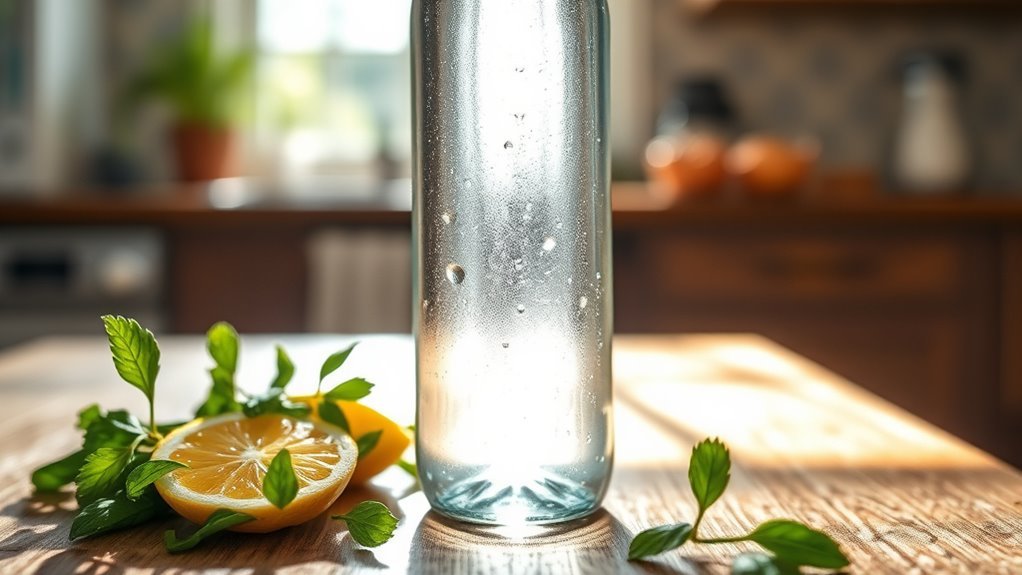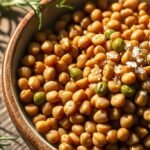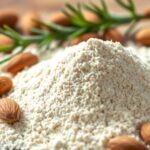On a ketogenic diet, you should aim for 3 to 4 liters of water daily to compensate for increased fluid loss. Ketosis alters your body’s water management and decreases water retention, making proper hydration essential for ideal performance and health. Pay attention to your activity level, environment, and signs of dehydration like dry mouth or fatigue, and proactively sip water throughout the day. Discover more tips and strategies to enhance your hydration on keto for better well-being.
Understanding Hydration Needs on a Ketogenic Diet
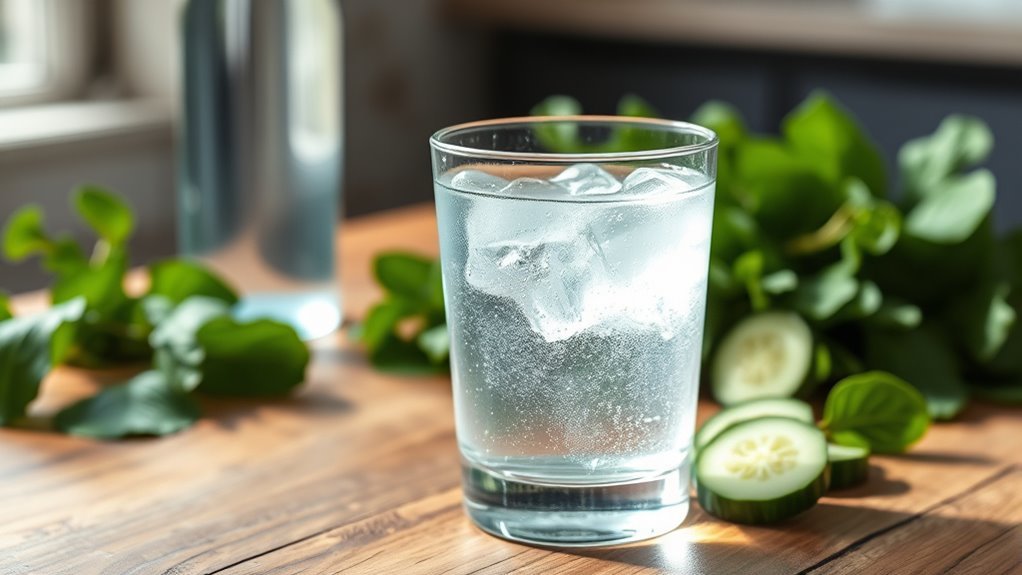
When you’re following a ketogenic diet, understanding your hydration needs is fundamental, as ketosis can alter how your body manages water and electrolytes. Many hydration myths suggest you only need to drink when thirsty, but on keto, your body might need more fluids due to increased water loss. Aim to drink plenty of keto-friendly fluids, like water, herbal teas, and electrolyte-rich beverages, to stay balanced. It’s important to monitor your intake and adjust based on activity levels and environmental conditions. Don’t overlook the significance of electrolytes—sodium, potassium, and magnesium play essential roles in hydration. By staying mindful of your hydration needs, you’ll support your body’s shift into ketosis and promote overall well-being on your keto journey.
How Keto Affects Water Retention
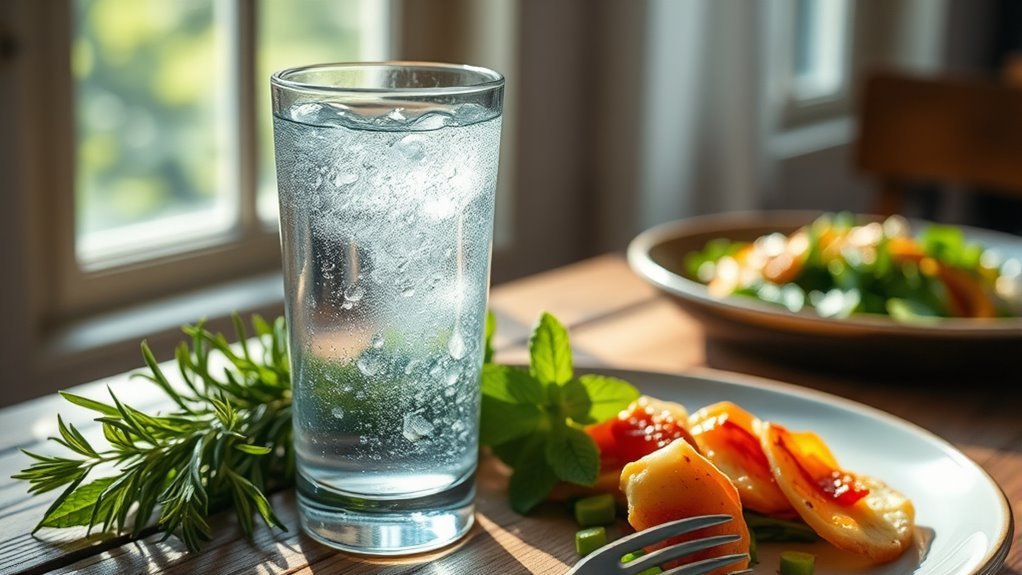
Although you might expect to retain more water on a typical diet, the ketogenic diet often leads to a decrease in water retention. This is primarily due to the reduction in glycogen storage. When you cut carbs, your body uses glycogen as energy, which binds water. As glycogen stores deplete, the water associated with it is released, resulting in less overall water retention. This can lead to weight loss in the initial stages of keto, which many find motivating. However, it’s important to stay hydrated, as decreased water retention doesn’t mean you’re off the hook. Ensuring you drink enough water helps maintain balance in your body, especially when adapting to the keto lifestyle.
Signs You May Be Dehydrated
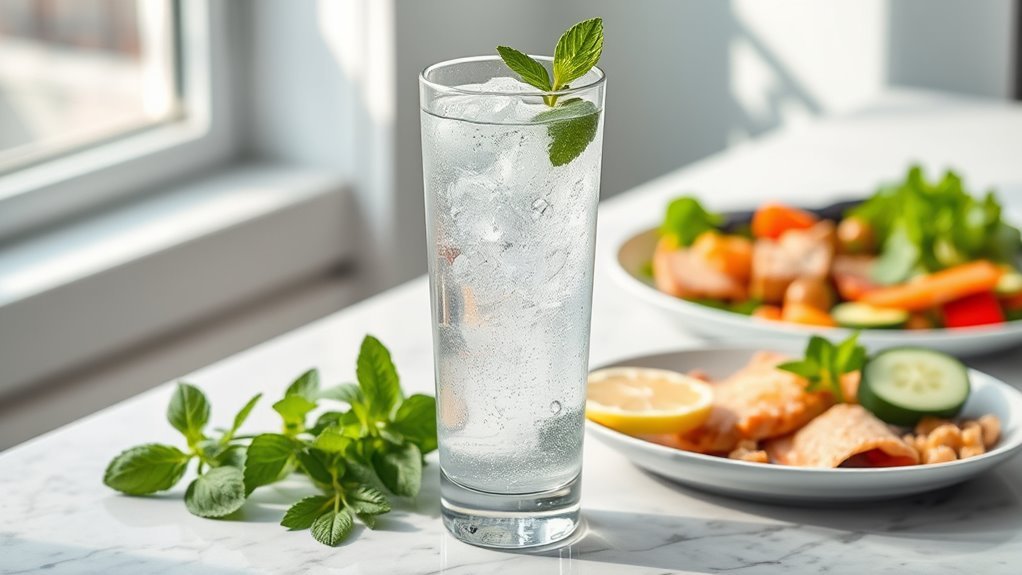
Dehydration can sneak up on you, especially when you’re following a ketogenic diet, so it’s important to recognize the signs. Common dehydration symptoms include dry mouth, increased thirst, fatigue, dizziness, and dark urine. If you’re experiencing any of these, it’s vital to act quickly. You might also notice headaches or a lack of focus, which can hinder your freedom to enjoy life fully. To combat dehydration, consider hydration strategies such as drinking water regularly, adding electrolytes, or consuming hydrating foods like cucumber and spinach. By staying aware of these symptoms and implementing effective hydration strategies, you can keep your energy levels up and maintain your keto lifestyle without feeling sluggish. Your body will thank you!
Recommended Daily Water Intake on Keto
Understanding how much water to drink on a ketogenic diet is crucial for maintaining your health and energy levels. On keto, a good rule of thumb for your daily intake is to aim for at least 3 to 4 liters, or about 13 to 16 cups, depending on your activity level. This helps counterbalance the diuretic effect of ketosis. Hydration tips include sipping water consistently throughout the day and incorporating electrolyte-rich beverages to support your body. You might also consider tracking your fluid intake to guarantee you’re meeting your needs. Remember, individual requirements can vary, but staying well-hydrated is key to enjoying the benefits of a ketogenic lifestyle while feeling your best.
Factors That Influence Your Hydration Needs
When you’re on a ketogenic diet, several factors can influence how much water you need to stay hydrated. Your individual activity level plays a big role—more exercise means you’ll need more fluids. Environmental factors, like temperature and humidity, also impact hydration; hot weather can increase your needs. Additionally, dietary composition affects fluid balance; a high protein intake may require more water. Your metabolic rate is essential too; a faster metabolism can lead to increased water loss. Health conditions, age considerations, and stress levels can further modify your requirements. Finally, exercise intensity and body weight should be considered; larger individuals or those engaging in high-intensity workouts need more hydration. Stay mindful of these factors to optimize your keto journey.
The Role of Electrolytes in Hydration
While staying hydrated on a ketogenic diet is essential, the role of electrolytes can’t be overlooked. Maintaining sodium balance is vital, as low sodium can lead to dehydration symptoms like fatigue and dizziness. Incorporate potassium sources such as avocados and spinach to support muscle function and reduce cramping. Don’t forget magnesium’s importance; it aids in energy production and helps with sleep quality. Consider electrolyte supplements if you struggle to meet your needs through food alone. They can be a practical solution to maintain hydration strategies while on keto. By focusing on these electrolytes, you’ll enhance your overall hydration and support your body’s functions, allowing you the freedom to enjoy your ketogenic lifestyle fully.
Tips for Staying Hydrated on Keto
Staying hydrated on a keto diet is essential, especially since your body tends to excrete more water and electrolytes during this low-carb phase. To guarantee you’re getting enough fluids, consider effective hydration strategies like drinking a glass of water before meals or setting reminders on your phone. Don’t forget to include water alternatives such as herbal teas, coconut water, or bone broth that can enhance your intake while providing additional nutrients. If you’re feeling adventurous, try infusing your water with fruits or herbs for a revitalizing twist. Keep track of your hydration levels by observing your urine color—it should be light yellow. Staying mindful of your hydration can help you thrive in your keto journey.
Hydration Sources Beyond Water
Although water is the most recognized source of hydration, there are several other options that can help you meet your fluid needs on a keto diet. Herbal teas offer a flavorful, low-calorie choice, while coconut water provides natural electrolytes, keeping you balanced. Broth benefits include hydration and essential nutrients, making it a warm, comforting option. Low carb smoothies and vegetable juices can boost hydration and nutrition without spiking your carbs. If you’re looking for something invigorating, consider flavored water or electrolyte infused drinks to enhance your hydration experience. Finally, hydration tablets can be a convenient way to guarantee you’re getting necessary electrolytes without extra calories. Embrace these alternatives for a varied and enjoyable hydration routine!
Common Mistakes in Keto Hydration
When you’re on a keto diet, you might not realize how much water you actually need, leading to dehydration. Many also overlook the importance of maintaining electrolyte balance, which can impact your energy levels and overall health. Plus, relying solely on thirst signals can be misleading, especially when your body’s hydration needs change.
Underestimating Water Needs
Many people underestimate how much water they really need while following a ketogenic diet. Water intake misconceptions can lead to dehydration, which may affect your energy levels and overall well-being. It’s essential to listen to your body and guarantee you’re staying adequately hydrated.
| Activity Level | Recommended Water Intake | Signs of Dehydration |
|---|---|---|
| Sedentary | 2-3 liters | Dry mouth, fatigue |
| Moderate | 3-4 liters | Headaches, dizziness |
| Active | 4-5 liters | Dark urine, cramps |
| Very Active | 5+ liters | Confusion, weakness |
Ignoring Electrolyte Balance
While staying hydrated is essential on a ketogenic diet, neglecting electrolyte balance can lead to serious complications. Many people fall victim to hydration myths, believing that simply drinking water is enough. However, when you cut carbs, you may experience electrolyte depletion, particularly in sodium, potassium, and magnesium. These electrolytes are vital for nerve function and muscle contractions. Without them, you could face fatigue, cramps, or even heart issues. To maintain ideal hydration, focus on replenishing electrolytes through foods like avocados and leafy greens or consider supplements. Remember, true freedom on keto comes from understanding your body’s needs, not just following the surface-level hydration tips. Prioritize your electrolyte balance to thrive on your ketogenic journey.
Relying on Thirst Signals
Relying solely on thirst signals is a common mistake many make on a ketogenic diet. While thirst cues can indicate when you need water, they’re often not reliable enough, especially when your body is adapting to ketosis. During this phase, you might experience increased fluid loss, making it essential to maintain hydration awareness. Instead of waiting to feel thirsty, consider setting a routine for water intake throughout the day. Aim to drink a specific amount regularly, adjusting based on your activity level and climate. This proactive approach guarantees you stay hydrated, supports your energy levels, and helps prevent potential side effects like headaches or fatigue. Remember, hydration is key to thriving on your keto journey!
Monitoring Your Hydration Levels
As you commence your keto journey, monitoring your hydration levels becomes essential for maintaining overall health and optimizing your body’s performance. Since the ketogenic diet can lead to increased water loss, effective hydration tracking is vital. Consider using apps or journals to keep an eye on your daily water intake. Aim for at least 2-3 liters daily, adjusting based on your activity level and climate. Pay attention to signs of dehydration, like dry mouth or fatigue, and adjust your intake accordingly. Additionally, incorporate electrolytes to help balance your hydration. By prioritizing hydration monitoring, you empower yourself to enjoy the freedom of the keto lifestyle while ensuring your body functions at its best.
Frequently Asked Questions
Can I Drink Flavored Water While on Keto?
Yes, you can drink flavored water while on keto! Just make sure to choose keto-friendly options that are low in carbs and free from added sugars. Look for brands that use natural flavorings or infuse your water with slices of citrus, berries, or herbs. Staying hydrated is essential, and flavored water can make it more enjoyable. Always check labels to avoid hidden carbs that could kick you out of ketosis. Enjoy your hydration!
How Does Caffeine Affect My Hydration on Keto?
Caffeine can be a double-edged sword for your hydration balance on keto. While it boosts metabolism and energy, it’s also a mild diuretic, which might lead to increased fluid loss. Don’t fret, though! If you enjoy your morning coffee or tea, just make sure you’re compensating with extra water throughout the day. Staying mindful of your intake can help you enjoy the benefits without compromising your hydration. Balance is key!
Is It Safe to Drink Too Much Water on Keto?
Yes, it can be unsafe to drink too much water on keto. While staying hydrated is vital, overconsumption can lead to water toxicity, disrupting your hydration balance and causing potentially serious health issues like hyponatremia. It’s important to listen to your body and drink according to your thirst, especially when adjusting to a low-carb diet. Aim for a sensible intake, and consult a healthcare professional if you’re unsure about your hydration needs.
Should I Adjust My Water Intake During Exercise?
You’re like a ship steering through a vast ocean; without proper hydration, you risk capsizing. Yes, you should adjust your water intake during exercise. As your workout intensity rises, so does your need for hydration. Implementing effective hydration strategies—like sipping water before, during, and after your sessions—ensures your body stays balanced and energized. Embrace this freedom to perform at your best, and let your vessel sail smoothly through every workout.
Can I Rely on Food Sources for Hydration on Keto?
Yes, you can rely on food sources for hydration on keto! Many keto snacks, like cucumbers, avocados, and leafy greens, contain high water content, helping you stay hydrated. Incorporating these foods into your diet not only supports hydration but also adds essential nutrients. Just remember, while food hydration is beneficial, it shouldn’t completely replace your water intake. Balancing both will keep you feeling great and free to enjoy your keto journey!
Frequently Asked Questions about Water Intake on Keto
1. How much water should I drink while on a keto diet?
The general recommendation for water intake on a keto diet is to aim for at least 2 to 3 liters (around 8 to 12 cups) per day. However, this can vary based on factors such as your activity level, climate, and individual hydration needs. Since the keto diet can lead to a loss of water weight and electrolytes, maintaining hydration is crucial to avoid dehydration and support overall health.
2. Why is hydration important on a keto diet?
Hydration is particularly important on a keto diet because the body tends to lose more water and electrolytes when entering ketosis. This can lead to symptoms of dehydration, such as fatigue, dizziness, and headaches. Adequate water intake helps to maintain electrolyte balance, supports metabolic functions, and can alleviate some common side effects of the keto diet, such as the “keto flu.”
3. How can I tell if I am drinking enough water on keto?
Signs that you may not be drinking enough water include dark yellow urine, dry mouth, fatigue, dizziness, and headaches. A good rule of thumb is to check the color of your urine; pale yellow indicates proper hydration. Additionally, if you find yourself feeling excessively thirsty or experiencing constipation, these can also be signs that you need to increase your water intake.
4. Can I drink other beverages instead of water on a keto diet?
Yes, while water should be your primary source of hydration, you can also include other low-calorie, keto-friendly beverages such as herbal teas, black coffee, and electrolyte drinks. Just be cautious with beverages that contain sugar or high carbs, as they can disrupt ketosis. Additionally, bone broth is an excellent option for hydration and electrolyte replenishment on a keto diet.
5. What should I do if I experience dehydration symptoms on keto?
If you experience symptoms of dehydration, the first step is to increase your water intake immediately. Additionally, consider replenishing electrolytes by consuming foods rich in potassium, magnesium, and sodium, or using electrolyte supplements. If symptoms persist or worsen, it is advisable to consult with a healthcare professional to ensure there are no underlying health issues.
References
- https://www.ncbi.nlm.nih.gov/pmc/articles/PMC6074260/
- https://www.healthline.com/nutrition/keto-diet-and-water
- https://www.webmd.com/diet/what-is-the-keto-diet
- https://www.cdc.gov/nutrition/resources-publications/understanding-hydration.html
- https://www.nutrition.org.uk/healthyliving/hydration.html
- https://www.mayoclinic.org/healthy-lifestyle/nutrition-and-healthy-eating/in-depth/hydration/art-20044234
